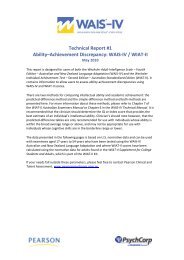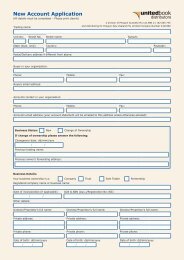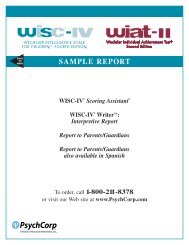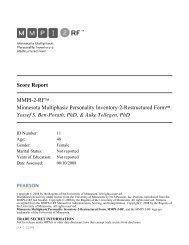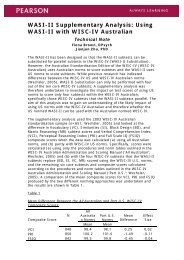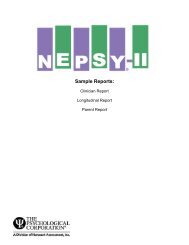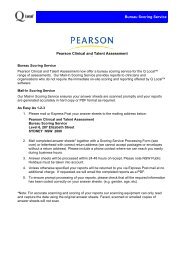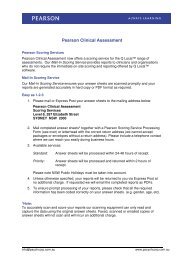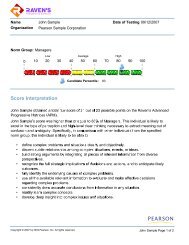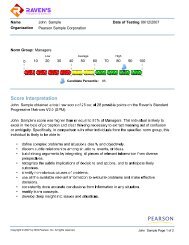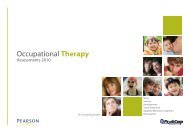SAMPLE
Clinical Settings with Spine Surgery/Spinal Cord Stimulator Candidate
Clinical Settings with Spine Surgery/Spinal Cord Stimulator Candidate
- No tags were found...
You also want an ePaper? Increase the reach of your titles
YUMPU automatically turns print PDFs into web optimized ePapers that Google loves.
Interpretive Report: Clinical Settings<br />
<br />
<br />
<br />
Yossef S. Ben-Porath, PhD, & Auke Tellegen, PhD<br />
<br />
<br />
<br />
<br />
<br />
<br />
<br />
<strong>SAMPLE</strong><br />
<br />
<br />
<br />
<br />
<br />
<br />
<br />
<br />
<br />
MMPI-2-RF Manual for Administration, Scoring, and Interpretation<br />
<br />
MMPI-2-RF MMPI-2-RF logo Minnesota Multiphasic Personality<br />
Inventory-2-Restructured Form Pearson, PSI logo, PsychCorp<br />
<br />
TRADE SECRET INFORMATION
MMPI-2-RF ® Interpretive Report: Clinical Settings ID:1182<br />
03/28/2011, Page 2<br />
MMPI-2-RF Validity Scales<br />
120<br />
--- ---<br />
---<br />
---<br />
---<br />
---<br />
110<br />
100<br />
---<br />
90<br />
80<br />
70<br />
60<br />
50<br />
40<br />
30<br />
20<br />
---<br />
VRIN-r<br />
F<br />
F<br />
<strong>SAMPLE</strong><br />
TRIN-r<br />
---<br />
F-r<br />
---<br />
Fp-r<br />
---<br />
Fs<br />
---<br />
FBS-r<br />
---<br />
L-r<br />
---<br />
---<br />
K-r<br />
Raw Score:<br />
4<br />
10<br />
6<br />
0<br />
3<br />
16<br />
4<br />
9<br />
T Score:<br />
53<br />
57 F<br />
70<br />
42<br />
66<br />
77<br />
57<br />
55<br />
Response %:<br />
100<br />
96<br />
100<br />
100<br />
100<br />
100<br />
100<br />
100<br />
Cannot Say (Raw): 1<br />
Percent True (of items answered): 29%<br />
Comparison Group Data: Spine Surgery/Spinal Cord Stimulator Candidate (Women), N = 266<br />
Mean Score ( ): 48 52 F 56 49 56 65 59 53<br />
Standard Dev ( + _ 1 SD ):<br />
10 9 13 9 15 11 11 10<br />
The highest and lowest T scores possible on each scale are indicated by a "---"; MMPI-2-RF T scores are non-gendered.<br />
VRIN-r<br />
TRIN-r<br />
F-r<br />
Fp-r<br />
Variable Response Inconsistency<br />
True Response Inconsistency<br />
Infrequent Responses<br />
Infrequent Psychopathology Responses<br />
Fs<br />
FBS-r<br />
L-r<br />
K-r<br />
Infrequent Somatic Responses<br />
Symptom Validity<br />
Uncommon Virtues<br />
Adjustment Validity
MMPI-2-RF ® Interpretive Report: Clinical Settings ID:1182<br />
03/28/2011, Page 3<br />
MMPI-2-RF Higher-Order (H-O) and Restructured Clinical (RC) Scales<br />
Higher-Order<br />
Restructured Clinical<br />
120<br />
110<br />
100<br />
90<br />
80<br />
---<br />
---<br />
---<br />
---<br />
---<br />
---<br />
---<br />
---<br />
---<br />
---<br />
---<br />
---<br />
70<br />
60<br />
50<br />
40<br />
30<br />
20<br />
---<br />
EID<br />
<strong>SAMPLE</strong><br />
---<br />
THD<br />
---<br />
BXD<br />
---<br />
RCd<br />
---<br />
RC1<br />
---<br />
RC2<br />
---<br />
RC3<br />
---<br />
RC4<br />
---<br />
RC6<br />
---<br />
RC7<br />
---<br />
RC8<br />
---<br />
RC9<br />
Raw Score:<br />
16<br />
0<br />
1<br />
7<br />
16<br />
8<br />
2<br />
3<br />
0<br />
5<br />
0<br />
4<br />
T Score:<br />
58<br />
39<br />
36<br />
55<br />
81<br />
65<br />
41<br />
46<br />
43<br />
48<br />
39<br />
36<br />
Response %:<br />
100<br />
96<br />
100<br />
100<br />
100<br />
100<br />
100<br />
100<br />
94<br />
100<br />
100<br />
100<br />
Comparison Group Data: Spine Surgery/Spinal Cord Stimulator Candidate (Women), N = 266<br />
Mean Score<br />
( ):<br />
51 48 43 52 64 55 46 44 49 46 48 42<br />
Standard Dev ( + _ 1 SD ):<br />
11 9 7 10 11 11 10 8 9 9 10 8<br />
The highest and lowest T scores possible on each scale are indicated by a "---"; MMPI-2-RF T scores are non-gendered.<br />
EID Emotional/Internalizing Dysfunction<br />
THD Thought Dysfunction<br />
BXD Behavioral/Externalizing Dysfunction<br />
RCd<br />
RC1<br />
RC2<br />
RC3<br />
RC4<br />
Demoralization<br />
Somatic Complaints<br />
Low Positive Emotions<br />
Cynicism<br />
Antisocial Behavior<br />
RC6<br />
RC7<br />
RC8<br />
RC9<br />
Ideas of Persecution<br />
Dysfunctional Negative Emotions<br />
Aberrant Experiences<br />
Hypomanic Activation
MMPI-2-RF ® Interpretive Report: Clinical Settings ID:1182<br />
03/28/2011, Page 4<br />
MMPI-2-RF Somatic/Cognitive and Internalizing Scales<br />
Somatic/Cognitive<br />
Internalizing<br />
120<br />
110<br />
100<br />
---<br />
---<br />
---<br />
---<br />
90<br />
80<br />
---<br />
---<br />
---<br />
70<br />
60<br />
50<br />
40<br />
30<br />
20<br />
---<br />
---<br />
---<br />
---<br />
<strong>SAMPLE</strong><br />
---<br />
---<br />
---<br />
GIC HPC NUC COG SUI HLP<br />
SFD<br />
NFC<br />
STW<br />
AXY<br />
ANP<br />
---<br />
BRF<br />
---<br />
MSF<br />
Raw Score:<br />
6<br />
2<br />
2<br />
7<br />
2<br />
0<br />
1<br />
---<br />
---<br />
---<br />
---<br />
---<br />
---<br />
---<br />
MLS<br />
---<br />
--- ---<br />
---<br />
---<br />
2<br />
3<br />
1<br />
0<br />
0<br />
1<br />
8<br />
T Score:<br />
75<br />
72<br />
59<br />
86<br />
54<br />
45<br />
52<br />
56<br />
51<br />
43<br />
44<br />
39<br />
56<br />
71<br />
Response %:<br />
100<br />
100<br />
100<br />
100<br />
100<br />
100<br />
100<br />
100<br />
100<br />
100<br />
100<br />
100<br />
100<br />
100<br />
Comparison Group Data: Spine Surgery/Spinal Cord Stimulator Candidate (Women), N = 266<br />
Mean Score<br />
( ):<br />
Standard Dev ( + _ 1 SD ):<br />
69 56 62 63 54 48 50 51 47 50 52 47 51 51<br />
11 14 9 13 12 9 11 10 9 10 12 9 10 8<br />
The highest and lowest T scores possible on each scale are indicated by a "---"; MMPI-2-RF T scores are non-gendered.<br />
MLS<br />
GIC<br />
HPC<br />
NUC<br />
COG<br />
Malaise<br />
Gastrointestinal Complaints<br />
Head Pain Complaints<br />
Neurological Complaints<br />
Cognitive Complaints<br />
SUI<br />
HLP<br />
SFD<br />
NFC<br />
STW<br />
Suicidal/Death Ideation<br />
Helplessness/Hopelessness<br />
Self-Doubt<br />
Inefficacy<br />
Stress/Worry<br />
AXY<br />
ANP<br />
BRF<br />
MSF<br />
Anxiety<br />
Anger Proneness<br />
Behavior-Restricting Fears<br />
Multiple Specific Fears
MMPI-2-RF ® Interpretive Report: Clinical Settings ID:1182<br />
03/28/2011, Page 5<br />
MMPI-2-RF Externalizing, Interpersonal, and Interest Scales<br />
Externalizing<br />
Interpersonal<br />
Interest<br />
120<br />
110<br />
100<br />
---<br />
90<br />
---<br />
---<br />
---<br />
80<br />
70<br />
60<br />
50<br />
40<br />
30<br />
20<br />
---<br />
---<br />
---<br />
<strong>SAMPLE</strong><br />
---<br />
---<br />
--- ---<br />
---<br />
---<br />
JCP SUB AGG ACT FML IPP SAV SHY DSF<br />
---<br />
---<br />
---<br />
---<br />
---<br />
---<br />
---<br />
AES<br />
---<br />
---<br />
MEC<br />
Raw Score:<br />
1<br />
0<br />
0<br />
0<br />
0<br />
6<br />
2<br />
6<br />
0<br />
4<br />
1<br />
T Score:<br />
50<br />
41<br />
37<br />
33<br />
37<br />
56<br />
47<br />
66<br />
44<br />
56<br />
43<br />
Response %:<br />
100<br />
100<br />
100<br />
100<br />
100<br />
100<br />
100<br />
100<br />
100<br />
100<br />
100<br />
Comparison Group Data: Spine Surgery/Spinal Cord Stimulator Candidate (Women), N = 266<br />
Mean Score ( ):<br />
Standard Dev ( + _ 1 SD ):<br />
46 44 44 44 46 50 51 46 48 47 45<br />
9 6 7 9 9 9 10 8 9 9 7<br />
The highest and lowest T scores possible on each scale are indicated by a "---"; MMPI-2-RF T scores are non-gendered.<br />
JCP<br />
SUB<br />
AGG<br />
ACT<br />
Juvenile Conduct Problems<br />
Substance Abuse<br />
Aggression<br />
Activation<br />
FML<br />
IPP<br />
SAV<br />
SHY<br />
DSF<br />
Family Problems<br />
Interpersonal Passivity<br />
Social Avoidance<br />
Shyness<br />
Disaffiliativeness<br />
AES<br />
MEC<br />
Aesthetic-Literary Interests<br />
Mechanical-Physical Interests
MMPI-2-RF ® Interpretive Report: Clinical Settings ID:1182<br />
03/28/2011, Page 6<br />
MMPI-2-RF PSY-5 Scales<br />
120<br />
110<br />
100<br />
90<br />
---<br />
---<br />
---<br />
---<br />
---<br />
80<br />
70<br />
60<br />
50<br />
40<br />
30<br />
20<br />
<strong>SAMPLE</strong><br />
---<br />
AGGR-r<br />
---<br />
PSYC-r<br />
---<br />
DISC-r<br />
---<br />
NEGE-r<br />
---<br />
INTR-r<br />
Raw Score:<br />
5<br />
1<br />
2<br />
4<br />
10<br />
T Score:<br />
41<br />
47<br />
38<br />
45<br />
60<br />
Response %:<br />
100<br />
100<br />
100<br />
100<br />
100<br />
Comparison Group Data: Spine Surgery/Spinal Cord Stimulator Candidate (Women), N = 266<br />
Mean Score ( ):<br />
Standard Dev ( + _ 1 SD ):<br />
48 48<br />
42<br />
49<br />
54<br />
8 9<br />
6<br />
10<br />
11<br />
The highest and lowest T scores possible on each scale are indicated by a "---"; MMPI-2-RF T scores are non-gendered.<br />
AGGR-r<br />
PSYC-r<br />
DISC-r<br />
NEGE-r<br />
INTR-r<br />
Aggressiveness-Revised<br />
Psychoticism-Revised<br />
Disconstraint-Revised<br />
Negative Emotionality/Neuroticism-Revised<br />
Introversion/Low Positive Emotionality-Revised
MMPI-2-RF ® Interpretive Report: Clinical Settings ID:1182<br />
03/28/2011, Page 7<br />
This interpretive report is intended for use by a professional qualified to interpret the MMPI-2-RF.<br />
The information it contains should be considered in the context of the test taker's background, the<br />
circumstances of the assessment, and other available information.<br />
SYNOPSIS<br />
This is a valid MMPI-2-RF protocol. Scores on the substantive scales indicate somatic complaints and<br />
emotional and interpersonal dysfunction. Somatic complaints include preoccupation with poor health,<br />
malaise, neurological symptoms, and gastrointestinal problems. Emotional-internalizing findings include<br />
depression and fears. Interpersonal difficulties relate to social anxiety.<br />
PROTOCOL VALIDITY<br />
This is a valid MMPI-2-RF protocol. There are no problems with unscorable items. The test taker<br />
responded to the items relevantly on the basis of their content, and there are no indications of over- or<br />
under-reporting.<br />
<strong>SAMPLE</strong><br />
SUBSTANTIVE SCALE INTERPRETATION<br />
Clinical symptoms, personality characteristics, and behavioral tendencies of the test taker are<br />
described in this section and organized according to an empirically guided framework. Statements<br />
containing the word "reports" are based on the item content of MMPI-2-RF scales, whereas statements<br />
that include the word "likely" are based on empirical correlates of scale scores. Specific sources for<br />
each statement can be viewed with the annotation features of this report.<br />
Somatic/Cognitive Dysfunction<br />
The test taker reports a diffuse pattern of somatic complaints involving different bodily systems 1<br />
including a number of vague neurological complaints 2 and a number of gastrointestinal complaints 3 . She<br />
is indeed likely to have a history of gastrointestinal problems 4 . She is also very likely to have a<br />
psychological component to her somatic complaints 5 . In addition, she is very likely to be prone to<br />
developing physical symptoms in response to stress 6 . She also reports experiencing poor health and<br />
feeling weak or tired 7 . She is indeed likely to be preoccupied with poor health 8 and to complain of sleep<br />
disturbance 9 , fatigue 10 , low energy 11 , and sexual dysfunction 9 .<br />
Emotional Dysfunction<br />
The test taker reports a lack of positive emotional experiences, significant anhedonia, and lack of<br />
interest 12 . Her low reported level of activation may be linked to this affective pattern 13 .
MMPI-2-RF ® Interpretive Report: Clinical Settings ID:1182<br />
03/28/2011, Page 8<br />
She reports multiple specific fears of certain animals and acts of nature 14 .<br />
Thought Dysfunction<br />
There are no indications of disordered thinking in this protocol.<br />
Behavioral Dysfunction<br />
There are no indications of maladaptive externalizing behavior in this protocol. The test taker's<br />
responses indicate a higher than average level of behavioral constraint 15 . She is unlikely to engage in<br />
externalizing, acting-out behavior 15 . In addition, she reports a below average level of aggressive behavior 16 .<br />
Interpersonal Functioning Scales<br />
The test taker reports being shy, easily embarrassed, and uncomfortable around others 17 . She is likely to<br />
be socially introverted 18 and inhibited 18 and to be anxious and nervous in social situations 18 .<br />
Interest Scales<br />
The test taker reports an average number of interests in activities or occupations of an aesthetic or<br />
literary nature (e.g., writing, music, the theater) 19 . She also reports an average number of interests in<br />
activities or occupations of a mechanical or physical nature (e.g., fixing and building things, the<br />
outdoors, sports) 20 .<br />
DIAGNOSTIC CONSIDERATIONS<br />
<strong>SAMPLE</strong><br />
This section provides recommendations for psychodiagnostic assessment based on the test taker's<br />
MMPI-2-RF results. It is recommended that she be evaluated for the following:<br />
Emotional-Internalizing Disorders<br />
- Somatoform disorder 21 , if physical origins for malaise 22 , neurological complaints 23 , and<br />
gastrointestinal complaints 24 have been ruled out<br />
- Depression-related disorder 25<br />
- Specific phobias 26<br />
Interpersonal Disorders<br />
- Social phobia 27<br />
TREATMENT CONSIDERATIONS<br />
This section provides inferential treatment-related recommendations based on the test taker's<br />
MMPI-2-RF scores.
MMPI-2-RF ® Interpretive Report: Clinical Settings ID:1182<br />
03/28/2011, Page 9<br />
Areas for Further Evaluation<br />
- Need for antidepressant medication 28 .<br />
- Extent to which genuine physical health problems contribute to the scores on the Somatic Complaints<br />
(RC1) and Neurological Complaints (NUC) scales 29 .<br />
- Origin of gastrointestinal complaints 24 .<br />
- Origin of malaise complaints 30 .<br />
Psychotherapy Process Issues<br />
- Likely to reject psychological interpretations of somatic complaints 29 .<br />
- Malaise may impede her willingness or ability to engage in treatment 30 .<br />
- Low positive emotionality may interfere with engagement in therapy 31 .<br />
Possible Targets for Treatment<br />
- Stress reduction for gastrointestinal complaints if stress-related 24<br />
- Anhedonia 31<br />
- Specific fears 26<br />
- Anxiety in social situations 27<br />
ITEM-LEVEL INFORMATION<br />
Unscorable Responses<br />
<strong>SAMPLE</strong><br />
Following is a list of items to which the test taker did not provide scorable responses. Unanswered or<br />
double answered (both True and False) items are unscorable. The scales on which the items appear are<br />
in parentheses following the item content.<br />
212. Item Content Omitted (True)<br />
ITEMS<br />
NOT<br />
SHOWN<br />
Special Note:<br />
The content of the test items<br />
is included in the actual reports.<br />
To protect the integrity of the test,<br />
the item content does not appear<br />
in this sample report.<br />
Critical Responses<br />
Seven MMPI-2-RF scales--Suicidal/Death Ideation (SUI), Helplessness/Hopelessness (HLP), Anxiety<br />
(AXY), Ideas of Persecution (RC6), Aberrant Experiences (RC8), Substance Abuse (SUB), and<br />
Aggression (AGG)--have been designated by the test authors as having critical item content that may<br />
require immediate attention and follow-up. Items answered by the individual in the keyed direction<br />
(True or False) on a critical scale are listed below if her T score on that scale is 65 or higher.<br />
The test taker has not produced an elevated T score (> 65) on any of these scales.
MMPI-2-RF ® Interpretive Report: Clinical Settings ID:1182<br />
03/28/2011, Page 10<br />
ENDNOTES<br />
This section lists for each statement in the report the MMPI-2-RF score(s) that triggered it. In addition,<br />
each statement is identified as a Test Response, if based on item content, a Correlate, if based on<br />
empirical correlates, or an Inference, if based on the report authors' judgment. (This information can<br />
also be accessed on-screen by placing the cursor on a given statement.) For correlate-based statements,<br />
research references (Ref. No.) are provided, keyed to the consecutively numbered reference list<br />
following the endnotes.<br />
1<br />
Test Response: RC1=81<br />
2<br />
Test Response: NUC=86<br />
3<br />
Test Response: GIC=72<br />
4<br />
Correlate: GIC=72, Ref. 9<br />
5<br />
Correlate: RC1=81, Ref. 2, 3, 4, 6, 7, 9<br />
6<br />
Correlate: RC1=81, Ref. 3, 9; NUC=86, Ref. 9<br />
7<br />
Test Response: MLS=75<br />
8<br />
Correlate: RC1=81, Ref. 2, 3, 4, 6, 7, 9; MLS=75, Ref. 9; NUC=86, Ref. 9<br />
9<br />
Correlate: MLS=75, Ref. 9<br />
10<br />
Correlate: RC1=81, Ref. 9; MLS=75, Ref. 9<br />
11<br />
Correlate: RC2=65, Ref. 1, 4, 9; MLS=75, Ref. 9<br />
12<br />
Test Response: RC2=65<br />
13<br />
Inference: RC2=65; ACT=33<br />
14<br />
Test Response: MSF=71<br />
15<br />
Correlate: BXD=36, Ref. 9; DISC-r=38, Ref. 9<br />
16<br />
Test Response: AGG=37<br />
17<br />
Test Response: SHY=66<br />
18<br />
Correlate: SHY=66, Ref. 9<br />
19<br />
Test Response: AES=56<br />
20<br />
Test Response: MEC=43<br />
21<br />
Correlate: RC1=81, Ref. 5<br />
22<br />
Correlate: MLS=75, Ref. 5<br />
23<br />
Inference: NUC=86<br />
24<br />
Inference: GIC=72<br />
25<br />
Correlate: RC2=65, Ref. 8, 9<br />
26<br />
Inference: MSF=71<br />
27<br />
Inference: SHY=66<br />
28<br />
Correlate: RC2=65, Ref. 9<br />
29<br />
Inference: RC1=81; NUC=86<br />
30<br />
Inference: MLS=75<br />
31<br />
Inference: RC2=65<br />
<strong>SAMPLE</strong>
MMPI-2-RF ® Interpretive Report: Clinical Settings ID:1182<br />
03/28/2011, Page 11<br />
RESEARCH REFERENCE LIST<br />
1. Arbisi, P. A., Sellbom, M., & Ben-Porath, Y. S. (2008). Empirical correlates of the MMPI-2<br />
Restructured Clinical (RC) Scales in psychiatric inpatients. Journal of Personality Assessment, 90,<br />
122-128.<br />
2. Forbey, J. D., & Ben-Porath, Y. S. (2008). Empirical correlates of the MMPI-2 Restructured<br />
Clinical (RC) Scales in a non-clinical setting. Journal of Personality Assessment, 90, 136-141.<br />
3. Forbey, J. D., Ben-Porath, Y. S., & Gartland, D. (2009). Validation of the MMPI-2 computerized<br />
adaptive version (MMPI-2-CA) in a correctional intake facility. Psychological Services, 6, 279-292.<br />
4. Handel, R. W., & Archer, R. P. (2008). An investigation of the psychometric properties of the<br />
MMPI-2 Restructured Clinical (RC) Scales with mental health inpatients. Journal of Personality<br />
Assessment, 90, 239-249.<br />
5. Locke, D. E. C., Kirlin, K. A., Thomas, M. L., Osborne, D., Hurst, D. F., Drazkowsi, J. F., Sirven, J.<br />
I., & Noe, K. H. (2010). The Minnesota Multiphasic Personality Inventory-2-Restructured Form in<br />
the epilepsy monitoring unit. Epilepsy & Behavior, 17(2), 252-258.<br />
6. Sellbom, M., Ben-Porath, Y. S., & Graham, J. R. (2006). Correlates of the MMPI-2 Restructured<br />
Clinical (RC) Scales in a college counseling setting. Journal of Personality Assessment, 86, 89-99.<br />
<strong>SAMPLE</strong><br />
7. Sellbom, M., Graham, J. R., & Schenk, P. (2006). Incremental validity of the MMPI-2 Restructured<br />
Clinical (RC) Scales in a private practice sample. Journal of Personality Assessment, 86, 196-205.<br />
8. Simms, L. J., Casillas, A., Clark, L. A., Watson, D., & Doebbeling, B. I. (2005). Psychometric<br />
evaluation of the Restructured Clinical Scales of the MMPI-2. Psychological Assessment, 17,<br />
345-358.<br />
9. Tellegen, A., & Ben-Porath, Y. S. (2008). The Minnesota Multiphasic Personality<br />
Inventory-2-Restructured Form (MMPI-2-RF): Technical manual. Minneapolis: University of<br />
Minnesota Press.<br />
End of Report<br />
This and previous pages of this report contain trade secrets and are not to be released in response to<br />
requests under HIPAA (or any other data disclosure law that exempts trade secret information from<br />
release). Further, release in response to litigation discovery demands should be made only in accordance<br />
with your profession's ethical guidelines and under an appropriate protective order.



